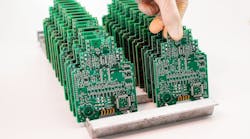When Qualcomm dropped its deal for NXP Semiconductors last year, both companies had to figure out how to flourish on their own. Qualcomm, the largest player in the mobile chip market, has had to confront a slowdown in global handset sales and mounting legal threats to its most profitable line of business. NXP, the world's largest supplier of automotive chips, has struggled to staunch declines in its core businesses.
NXP is trying to hold its head above water as the semiconductor industry's growth slows. The company said that strong communications infrastructure sales had failed to offset declines in its automotive, industrial and mobile businesses. That caused year-over-year sales to fall 8% to $2.1 billion in the first quarter of 2019. Still, the company's overall sales and profits came out on the higher end of the company's projected range.
Sales to the automotive industry fell from $1.13 billion to $1.04 billion since the first quarter last year. Other automotive chip suppliers, including Texas Instruments and Infineon Technologies, have also sounded the alarm bell on dampened demand for automotive chips. NXP's advanced driver assistance systems (ADAS) sales rose by more than 10% in the first quarter of 2019 while sales in every other product category slipped.
The company's communications infrastructure unit jumped 10% over the last year to $449 million. Eindhoven, Netherlands-based NXP sells a broad range of radio frequency chips to base station OEMs, sales that have surged amid the shift to 5G technology. Industrial and Internet of Things sales slumped 14% over the last year to $368 million as demand declines for general-purpose microcontrollers, particularly in China.
The semiconductor industry's sales have been shrinking for the last half year. Global revenues from the fourth quarter of 2018 to the first quarter of 2019 declined 17.6%, according to IC Insights. "The first quarter is usually the weakest quarter of the year for the IC market," IC Insights said, adding "that an abnormally strong second half of the year will be required in order to avoid a full-year double-digit IC market decline."
“We continue to believe the demand environment in the second half of 2019 should improve versus the first half, but the macroeconomic environment is still uncertain, especially in China,” Richard Clemmer, the chief executive of NXP, said in a statement. NXP said its revenues will rise more than 5% to between $2.15 and $2.25 billion in the second quarter of 2019, compared to $2.29 billion in the same quarter last year.

